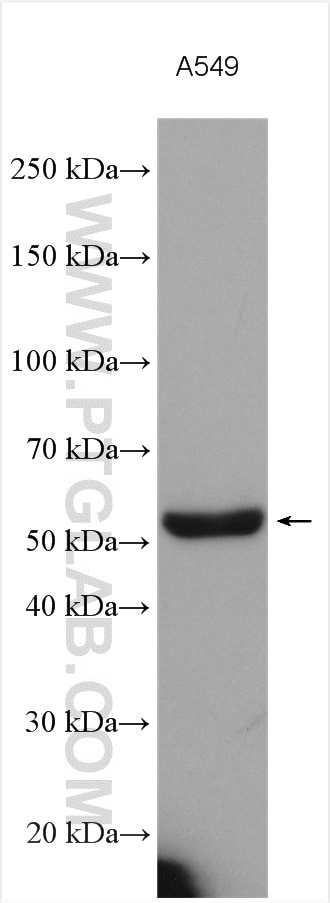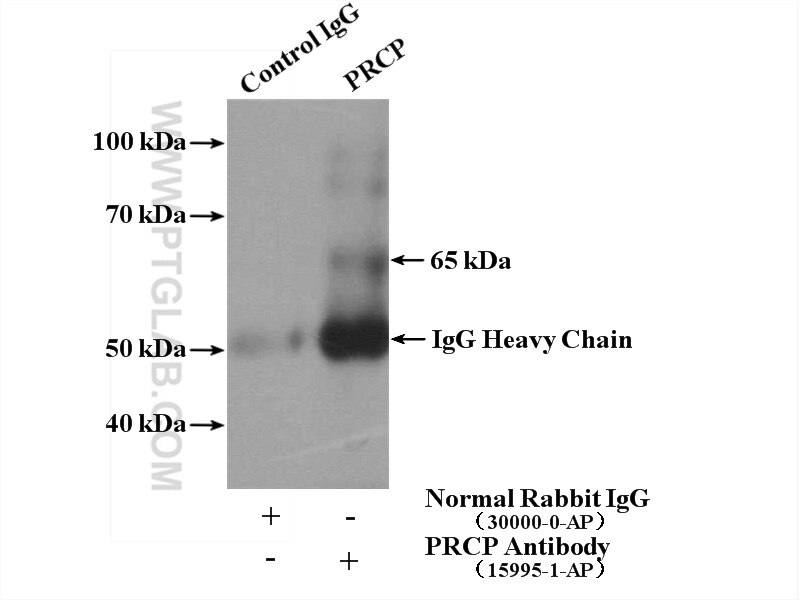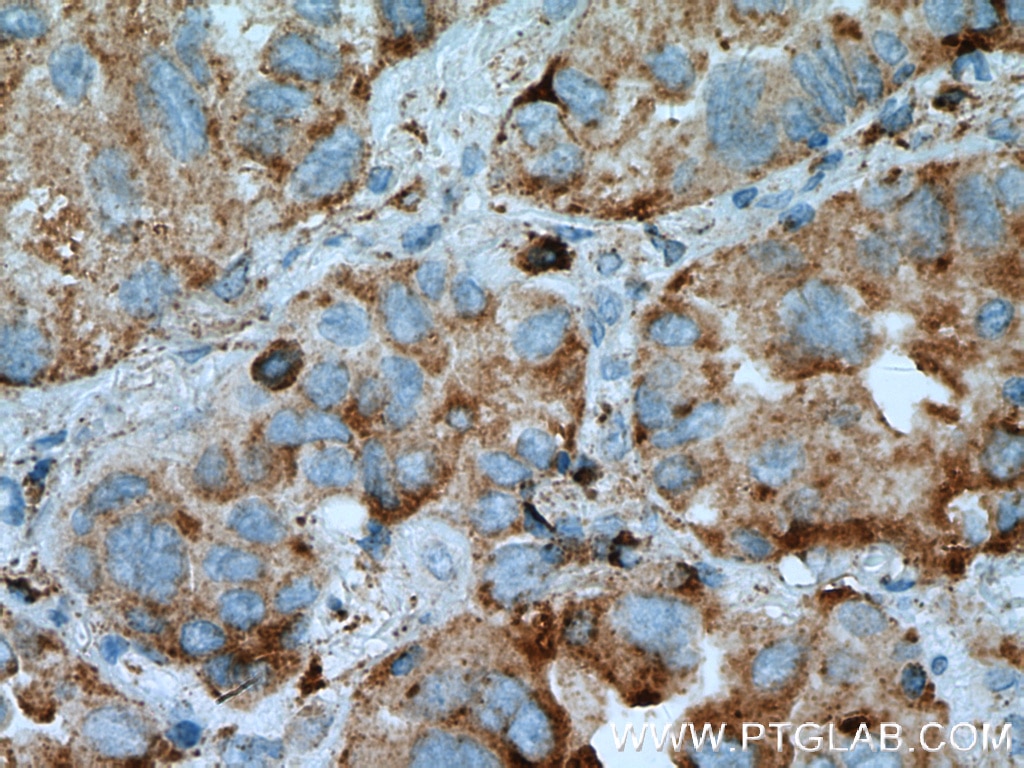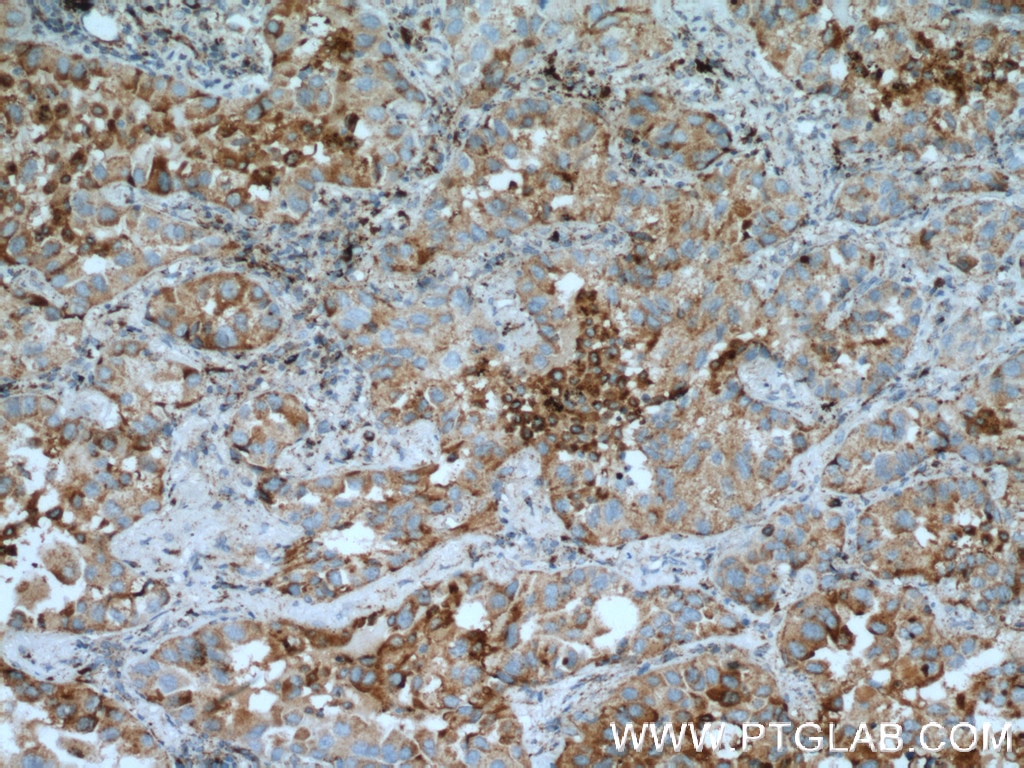Validation Data Gallery
Tested Applications
| Positive WB detected in | A549 cells |
| Positive IP detected in | L02 cells |
| Positive IHC detected in | human lung cancer tissue Note: suggested antigen retrieval with TE buffer pH 9.0; (*) Alternatively, antigen retrieval may be performed with citrate buffer pH 6.0 |
Recommended dilution
| Application | Dilution |
|---|---|
| Western Blot (WB) | WB : 1:500-1:1000 |
| Immunoprecipitation (IP) | IP : 0.5-4.0 ug for 1.0-3.0 mg of total protein lysate |
| Immunohistochemistry (IHC) | IHC : 1:50-1:500 |
| It is recommended that this reagent should be titrated in each testing system to obtain optimal results. | |
| Sample-dependent, Check data in validation data gallery. | |
Published Applications
| WB | See 3 publications below |
| IF | See 1 publications below |
Product Information
15995-1-AP targets PRCP in WB, IHC, IF, IP, ELISA applications and shows reactivity with human, mouse samples.
| Tested Reactivity | human, mouse |
| Cited Reactivity | human, mouse |
| Host / Isotype | Rabbit / IgG |
| Class | Polyclonal |
| Type | Antibody |
| Immunogen |
CatNo: Ag8869 Product name: Recombinant human PRCP protein Source: e coli.-derived, PGEX-4T Tag: GST Domain: 147-496 aa of BC001500 Sequence: SEQALADFAELIKHLKRTIPGAENQPVIAIGGSYGGMLAAWFRMKYPHMVVGALAASAPIWQFEDLVPCGVFMKIVTTDFRKSGPHCSESIHRSWDAINRLSNTGSGLQWLTGALHLCSPLTSQDIQHLKDWISETWVNLAMVDYPYASNFLQPLPAWPIKVVCQYLKNPNVSDSLLLQNIFQALNVYYNYSGQVKCLNISETATSSLGTLGWSYQACTEVVMPFCTNGVDDMFEPHSWNLKELSDDCFQQWGVRPRPSWITTMYGGKNISSHTNIVFSNGELDPWSGGGVTKDITDTLVAVTISEGAHHLDLRTKNALDPMSVLLARSLEVRHMKNWIRDFYDSAGKQH 相同性解析による交差性が予測される生物種 |
| Full Name | prolylcarboxypeptidase (angiotensinase C) |
| Calculated molecular weight | 496 aa, 56 kDa |
| Observed molecular weight | 56 kDa |
| GenBank accession number | BC001500 |
| Gene Symbol | PRCP |
| Gene ID (NCBI) | 5547 |
| RRID | AB_2169673 |
| Conjugate | Unconjugated |
| Form | |
| Form | Liquid |
| Purification Method | Antigen affinity purification |
| UNIPROT ID | P42785 |
| Storage Buffer | PBS with 0.02% sodium azide and 50% glycerol{{ptg:BufferTemp}}7.3 |
| Storage Conditions | Store at -20°C. Stable for one year after shipment. Aliquoting is unnecessary for -20oC storage. |
Background Information
PRCP(Lysosomal Pro-X carboxypeptidase) is also named as PCP and belongs to the peptidase S28 family. This enzyme cleaves C-terminal amino acids linked to proline in peptides such as angiotensin II, III and des-Arg9-bradykinin. PRCP is both a PK activator and an angiotensin II inactivator indicates another previously unappreciated interaction between the plasma kallikrein/kinin and the renin-angiotensin systems(PMID:11830581).Some previous gelfiltration and dynamic-light scattering results suggested that PRCP is a dimer in solution(PMID:20540760). The full length protein has a signal peptide, a propeptide and six glycosylation sites and can exsit as 65 kDa modified protein.
Protocols
| Product Specific Protocols | |
|---|---|
| IHC protocol for PRCP antibody 15995-1-AP | Download protocol |
| IP protocol for PRCP antibody 15995-1-AP | Download protocol |
| WB protocol for PRCP antibody 15995-1-AP | Download protocol |
| Standard Protocols | |
|---|---|
| Click here to view our Standard Protocols |
Publications
| Species | Application | Title |
|---|---|---|
Acta Pharmacol Sin α-MSH-catabolic enzyme prolylcarboxypeptidase in nucleus accumbens shell ameliorates stress susceptibility in mice through regulating synaptic plasticity | ||
Carcinogenesis Autophagy-mediated degradation of nuclear envelope proteins during oncogene-induced senescence. | ||
Dose Response Decrease of Prolylcarboxypeptidase Dose of Aqueous Humor is Involved in the Pathogenesis of Primary Open-Angle Glaucoma via Finetuning of the Local Ocular Renin-Angiotensin System |




